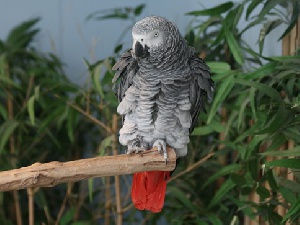We’ve reported that wild African greys in the wild are in trouble. But the exact numbers are grim in the country of Ghana: According to New Scientist, the African grey population has dropped 99 percent.
This news comes thanks to Nathaniel Annorbah of Manchester Metropolitan University in the UK. His study, according to New Scientist, revealed that:
"His team found grey parrots in only 10 of 42 cells — each of 100 square kilometres — in the country’s forests. In three roost areas that each harbored between 700 and 1200 birds two decades ago, Annorbah only found 18 parrots in total.
‘It’s pretty shocking,’ says Nigel Collar of BirdLife International, a co-author on the paper. ‘It’s very difficult to know what can be done.’”
Annorbah also asked 900 Ghanaians what was to blame for the decline in African greys. Forty-two percent thought deforestation was the issue; 37 percent said it was the pet trade.
This doesn’t look good for other countries involved in the African grey trade. Is there any hope for African greys?
New Scientist pointed out greys in other parts of Africa might be OK, but that the trade is unsustainable. As we reported, the World Parrot Trust (WPT) believes there needs to be a change in the Convention on International Trade in Endangered Species (CITES) status of African greys.
"Due to the export of so many excess thousands of birds each year, WPT believes research findings regarding wild populations warrant a change in status. [Dr. Rowan Martin, Manager of the World Parrot Trust's Africa Conservation Programme] asserts that ‘an important step towards arresting the decline in wild populations will be to end the legal commercial trade in wild caught Grey parrots through placing Grey parrots on Appendix I of CITES.’” What does that mean? "Appendix I includes species threatened with extinction. Trade in specimens of these species is permitted only in exceptional circumstances,” CITES explains on their website.
General News of Saturday, 5 December 2015
Source: birdchannel.com













